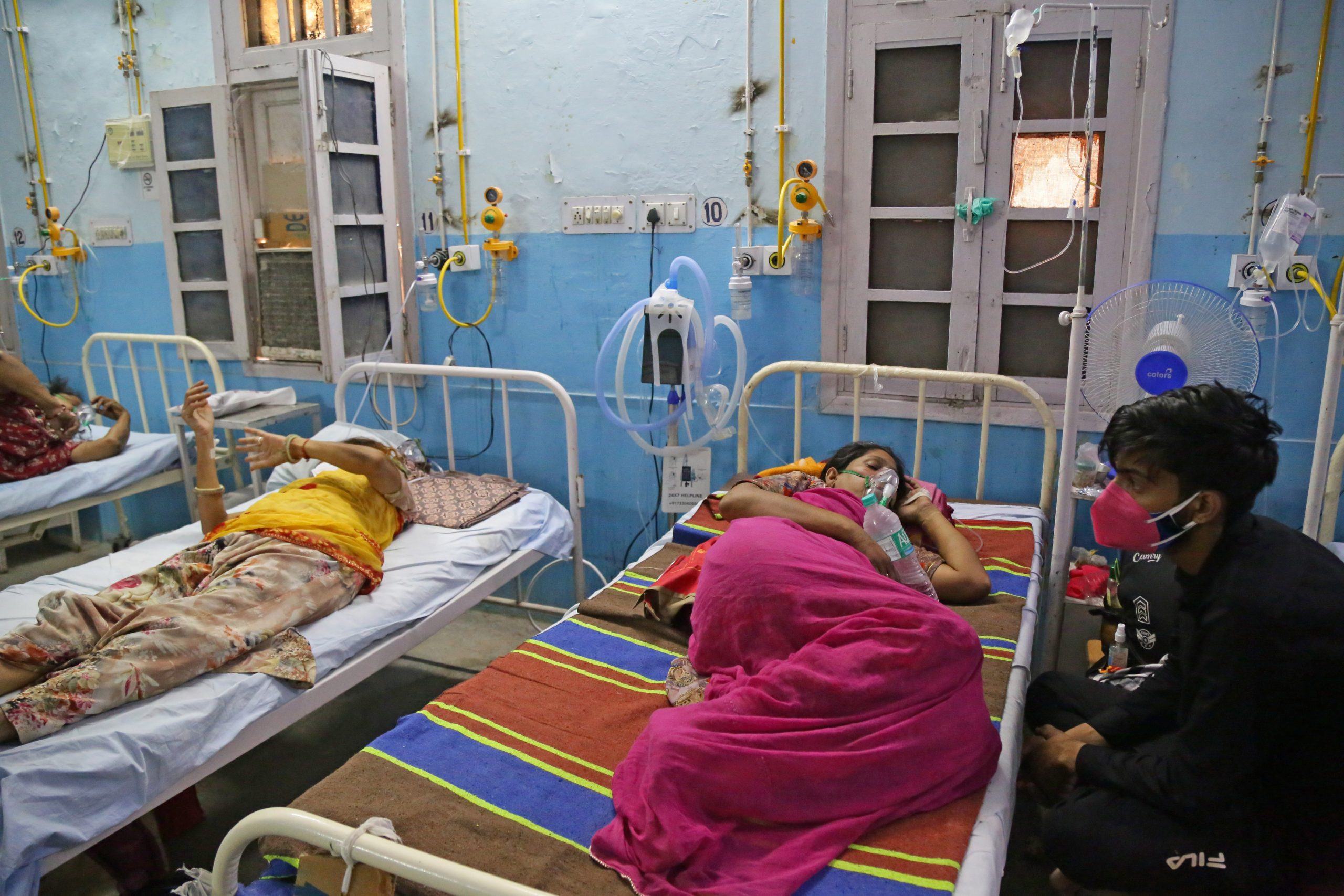“This is not the time for us to stop seeking God”: Man who lost 3 relatives in India’s second Covid-19 wave
As India reels from tragedy after tragedy, how can the body of Christ rise up? This is the second of a 5-part special report on India's Covid-19 crisis.
by Gracia Lee // June 4, 2021, 12:31 am

Covid-19 patients receive treatment at a government hospital in Beawar, amid shortage of oxygen and beds due to surge in cases. Photo by Sumit Saraswat/ Shutterstock.com.
It has been an exhausting three months for Ramesh*.
Just three weeks ago on May 13, he lost a third member of his family – a 28-year-old first cousin – in the second Covid-19 wave that has devastated millions in his homeland of India.
The young man had contracted the virus while caring for his 30-year-old brother, who was battling Covid-19. The latter died from a heart attack on the morning of May 7 while being transferred between hospitals.
Ramesh cannot bring himself to inform his late cousins’ parents that yet another one of their three sons is dead.
That same evening, after overseeing his brother’s burial, the younger man suffered breathing difficulties. His family rushed him to several hospitals, only to find that there were no available beds. By the time they found one, doctors said his lungs had already been badly damaged.
Within six days of his brother’s passing, he was dead too.
Ramesh, 44, cannot bring himself to inform his late cousins’ parents – his aunt and uncle – that yet another one of their three sons is dead.
Their father is still in hospital requiring oxygen support. Their mother is being quarantined in an isolation facility alone. The brother they left behind, who is the twin of the younger man who died, has stopped eating and sleeping.
A nation enveloped by grief
Ramesh’s cousins are just faceless statistics in India’s record-breaking death tolls since the second wave of the pandemic ravaged the country.
At the time of reporting (June 4), more than 28 million people in India have contracted the virus. Data from the health ministry show that more than 330,000 have died from it, though experts have said the actual toll may be far higher.
According to an article by The New York Times published on May 25, it is likely that an estimated 539 million people have contracted the virus, of which 1.6 million have died.
In recent weeks, the official number of new daily cases has fallen from over 400,000 at its peak in early May to under 200,000, and daily death tolls have also dipped.
Yet, it is evident that grief still lies heavy on the nation.
“I hear so much of bad news that it is also weighing down on me.”
News reports abound of the loved ones wailing in overcrowded hospitals, thousands of children orphaned by the pandemic and millions of families forced into poverty, surviving on just one meal a day.
Grief lies heavy on Ramesh, too.
Earlier in March, his father-in-law had also succumbed to the virus.
“I don’t think I’ll come back,” the 71-year-old had told Ramesh as he was warded in hospital for low oxygen levels. Not too long after that, he was wheeled into the intensive care unit and hooked up to a ventilator.
In less than four days, he was dead.
At least nine other family members have contracted Covid-19, including Ramesh and his wife who had caught the virus after caring for her late father.
Faced with the reality of the situation, he and his wife have had to have difficult conversations about what to do – especially how to care for their sons, aged two and 11 – should one of them die.
Raised for such a time as this
His grief is not just personal, but collective too. It is difficult to watch their nation crumbling under crushing helplessness.
“It is total chaos,” said Ramesh, who spoke to Salt&Light over Zoom from his home in Chennai, which has been in lockdown since May 24.
“I think God has raised us Christians for such as time as this. I think there is no better time for me to have lived.”
Every few minutes, his phone pings with requests for prayer and practical help: We need some cash to get by. Can you help us look for a job? Can you arrange for an oxygen concentrator? Our school teacher has died. Our principal has resigned. Do you know anyone who can help? Do you know any nurses?
“We aren’t able to predict the kind of calls that come to us. It’s like anything and everything. And it’s not only for me. Every leader of organisations is like 200% maxed out to their capacity,” said Ramesh, who is a director in a Christian organisation.
The grief and torrent of demands have taken a toll on him. “I hear so much of bad news that it is also weighing down on me,” he said, adding that both he and his wife have been suffering from body pains as a result of the stress.
Yet, though he has questions about why God would allow all that is happening, he harbours no hint of anger or resentment toward Him.
When asked where God is in the suffering and chaos, his first response was not a lament.
Instead, his words reflected a deeper conviction: That God is right here. In me. In us, the body of Christ.
With the tone of his voice growing in intensity, he said: “I think God has raised us Christians for such a time as this.
His words reflected a deeper conviction: That God is right here. In me. In us, the body of Christ.
“I believe this is a time for which I have been designed, I have been placed, I have been recruited, I have been enlisted in God’s ministry as an ambassador, and I think there is no better time for me to have lived.”
This is why he soldiers on in picking up calls for help and doing what he can about their requests for money, jobs, oxygen, prayer, encouragement and advice.
“Yes, we are dying. Yes, we are sick. Yes, we are suffering. Yes, we are mourning. But in times of darkness, that’s when the light shines. In times of sorrow, that’s when joy comes. And in times of confusion, God gives peace.”
Despite this overwhelming fatigue, he reminds himself that Jesus was the one who had commanded his disciples to heal all kinds of sickness and diseases (Matthew 10:1).
“It’s not me trying to save the world. Jesus is the one on the rescue mission and we, the body of Christ, are just going along with Him. That takes the pressure off us and gives us so much freedom to not get bogged down by the demands of what is going around.”
Faith under fire
All this, Ramesh says with full conviction even though his faith has come under fire by those closest to him.
When both his father- and mother-in-law were admitted to hospital because of Covid-19, some of his wife’s relatives had repeatedly asked Ramesh and his wife to go to various temples to pray.
“I believe this is a time for which I have been placed, I have been recruited, I have been enlisted in God’s ministry as an ambassador.”
However, the couple had declined and had instead expressed faith that their God could heal and restore her parents. It was their prayer and belief that He would.
So, when Ramesh’s father-in-law died, followed by Ramesh’s two cousins, many of their relatives, 80% of whom are non-believers, questioned their faith.
“Why did God allow your father to die? Why did He allow you to get Covid when you are doing all these things for Him? Why did He allow your cousins to die? They were helpful people.
“What is this prayer you’re bringing? What is the worship you’re bringing? What is the motivation you have to worship?” said Ramesh, recalling the barrage of questions he and his wife received.
They have been trying to help their relatives see that, even though there are some questions they do not have answers to, God is still good and God still answers prayers.
They point them to how God has healed hundreds of thousands of people, including themselves and Ramesh’s mother-in-law, from Covid-19, and how He has galvanised countless people across the country to rise up and support, help and love those in need.
They point them also to the Bible, where they can find so much comfort in and grace from God even in the midst of such intense suffering.
“In times of darkness, that’s when the light shines. In times of sorrow, that’s when joy comes.”
While some of their relatives were genuinely seeking answers, others were confrontational and angry, said Ramesh.
In particular, they were angry that his wife’s family had come to Christ – something which had caused a rift between the extended family as many were opposed to Christianity.
They believed that this was the reason why his parents-in-law did not come to them for financial help so that they could receive treatment at a private hospital instead of a government hospital.
The estimated cost of treatment at a private hospital – about 300,000 rupees, or S$5,500, said Ramesh – had been far too costly for the family to afford.
Ramesh’s relatives accused him of “leaving (his father-in-law) to die” in the government hospital, and criticised him and his brother-in-law, who is a pastor, for giving up their well-paying jobs in the IT industry to become full-time ministry workers.
“They said, ‘If only you had money and insurance, you would have put him in a better hospital, so you are responsible for your father’s health’,” he said.
God hears
It has not been easy at all, admitted Ramesh. But he is grateful to have support from the body of Christ, which has been a lifeline for him.
He has a mentor who checks in on him and holds space for him to share his struggles and pain. He also has a close friend with whom he meets every day over Zoom.
For about 30 to 40 minutes, they sit together without any agenda and simply wait in God’s presence, asking Him to minister to them.
Sometimes they are led to sing a chorus. Sometimes they are led to share a verse from the Bible. Sometimes they are led to pray.
“In the midst of all this, if we leave the presence of God, we won’t find any answers.”
“That has been personally very beneficial to me,” said Ramesh.
He is also encouraged by the numerous prayer meetings and chains that have been formed, both in India and abroad.
“We’ve heard stories of prayer from the US, Singapore, Abu Dhabi, Australia. So many countries are praying for us, and people are asking how we are. That in itself is a huge support and benefit,” he said.
“Some people are also sending relief funds and support, which definitely helps in dealing with this whole thing. All this is what is giving us hope.”
Despite the troubles that abound, he expressed faith that God sees and hears their individual and collective cries.
He pointed to Psalm 34:6, which reads:
“This poor man cried, and the Lord heard him
and saved him out of all his troubles.”
“In this midst of all of this, if we leave the presence of God, we won’t find any answers. This is not the time for us to stop seeking God. Let us cry to God, each one of us in our own context, and God will deliver us.”
*Name has been changed for security reasons.
For more information on pandemic relief for India, contact [email protected].
Pray for families in India
Pray for:
- Believers who are being criticised by friends and family as they cling to their faith during this time.
- Comfort for all who have lost friends and loved ones.
- Strength and rest for those who are working tirelessly to provide relief and aid to others.
- Provision of resources, including oxygen, jobs and finances, to meet the nation’s great needs.
- Unity among believers to care and pray for one another during this difficult time.
MORE FROM OUR SPECIAL REPORT ON INDIA’S COVID CRISIS:
Church in India in crisis as deaths from Covid-19 leave leadership vacuum
We are an independent, non-profit organisation that relies on the generosity of our readers, such as yourself, to continue serving the kingdom. Every dollar donated goes directly back into our editorial coverage.
Would you consider partnering with us in our kingdom work by supporting us financially, either as a one-off donation, or a recurring pledge?
Support Salt&Light


